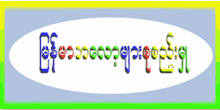Ubuntu ျဖစ္ျဖစ္ Backtrack ျဖစ္ျဖစ္ Linux Base System ကိုသုံးတဲ့သူတိုင္းသိသင့္တဲ့ အေျခခံ Command လိုင္းေလးေတြပါ အလြက္က်က္ထားစရာေတာ့မလိုပါဘူး သုံးရင္နဲ့တျဖည္းျဖည္း အလြတ္ရသြားပါလိမ့္မယ္……………….:P သုံးထားတဲ့စကားလုံးေတြက သိပ္အခက္ျကီးမဟုတ္လို့ဘာသာမျပန္ေတာ့ပါဘူး ဖတ္တတ္မယ္ထင္ပါတယ္ ကဲစလိုက္ရေအာင္………:P
File Command
ls – directory listing
ls -al – formatted listing with hidden files
cd dir – Change directory to dir
cd – Change to home
pwd – show current directory
mkdir dir – create a directory dir
rm file – delete file
rm -r dir -delete directory dir
rm -f file – force remove file
rm -rf dir – force remove directory dir*
cp file1 file2 – copy file1 to file2
cp -r dir1 dir2 – copy dir1 to dir2 ; create dir2 if it doesn’t exit
mv file1 file2 – rename or move file1 to file2 ;if file2 is an existing directory , move file1 into directory file2
ln -s file link – create symbolic link link to file
touch file – create or update file
cat > file – places standard input into file
more file – output the contents of file
head file – output the first 10 lines of file
tail file – out put the last 10 lines of file
tail -f file – output the contents of file as it grows, starting with the last 10 lines
Installation
Install form source
./ configure
make
make install
dpkg -i pkg.deb – install a package (debian)
rpm -Uvh pkg.rpm – install a package (RPM)
Network
Ping host – ping host and output results
whois domain – get whois information for domain
dig domain – get DNS information for domain
dig -x host – reverse lookup host
wget file – download file
wget -c file – continue a stopped download
Shortcuts
Ctrl+C – halts the current command
Ctrl+Z – stops the current command resume with fg in the foreground or bg in the background
Ctrl+D – log out of current session, similar to exit
Ctrl+W – erases one word in the current line
Ctrl+U – erases the whole line
Ctrl+R – type to bring up a recent command ……..repeats the last command
exit – log out of current session
Compression
tar cf file.tar files – created a tar named file.tar containing files
tar xf file.tar -extract the files from file.tar
tar czf file.tar.gz files – create a tar with Gzip compression
tar xzf file.tar.gz – extract a tar using Gzip
tar cjf file.tar.bz2 – create a tar wiht Bzip2 compression
tar xjf file.tar.bz2- extract a tar using Bzip2
gzip file – compresses file and rename it to file.gz
gzip -d file.gz – decompress file.gz back to file
Searching
grep pattern file – search for a pattern in file
grep -r pattern dir – search recursively for pattern in dir
command | grep pattern – search for pattern in the output command
locate file – find all instances of file
SSH
ssh user@host – connect to host as user
ssh -p port user@host – connect to host on port on port as user
ssh -copy -id user@host- add your key to host for user to enable a keyed or passwordless login
File Permissions
chmod octal file – change the premission of file to octal , which can be found separately for user,gruop and world by adding :
4 – read (r)
2 – write (w)
1 – execute (x)
Examples;
chmod 777 – read, write ,execute for all
chmod 755 – rwx for owner , rx for group and world For more option see man chmod .
Process Management
ps – display your currently active processes
top – display all running processes
kill pid – kill process id pid
killall proc – kill all processes and named proc*
bg – lists stopped for background jobs: resume a stopped job in the background
fg -brings the most recent job to foreground
fg n – brings job n to the foreground
System Info
date – show the current date and time
cal - show this month calendar
uptime – show current uptime
w – display who is online
whoami – who you are logged in as
finger user – display information about the user
uname -a – show kernel information
cat / proc/ cpuinfo – cpu information
cat / proc/ meminfo – memory information
man command – show the manual for command
df – show disk usage
du – show directory space usage
free – show memory and swap usage
whois app – show possible location of app
which app – show which app will be run by defult
အေျခခံလို့ေျပာေပမယ့္ ေတာ္ေတာ့္ကိုစုံပါတယ္ ဒီဟာေတြကိုအကုန္မမွတ္မိရင္ေတာင္မွနဲနဲေလးေတာ့သိထားသင့္တယ္လို့ထင္ပါတယ္……….. ဆက္လက္ျကိုးစားပါအုံးမယ္…
Basic Command For Linux / Backtrack
Subscribe to:
Post Comments (Atom)






0 comments:
Post a Comment